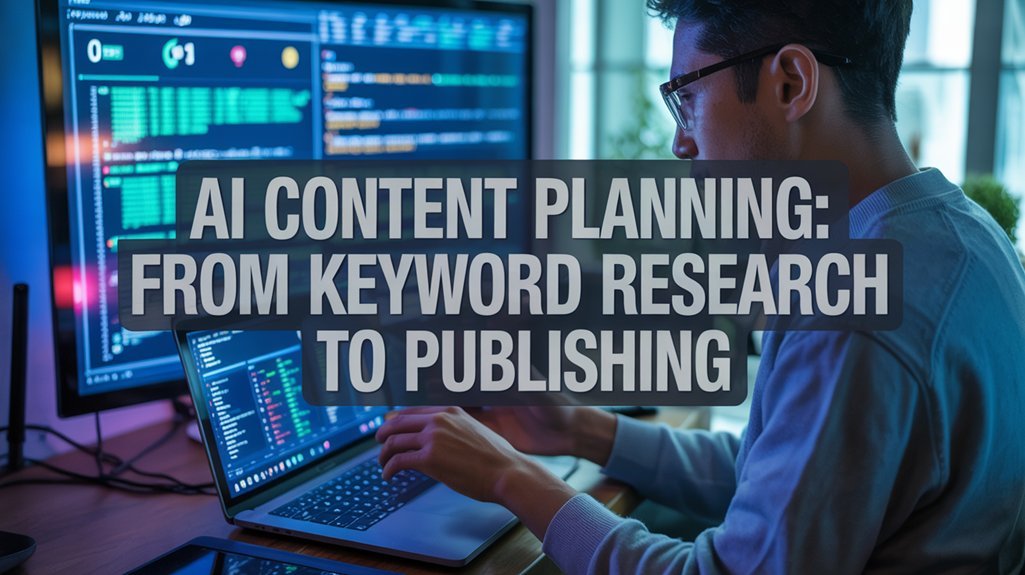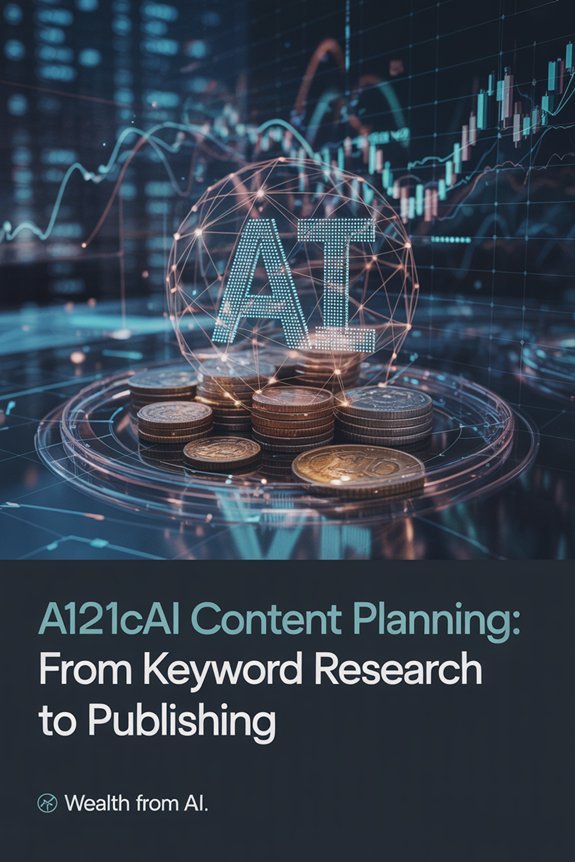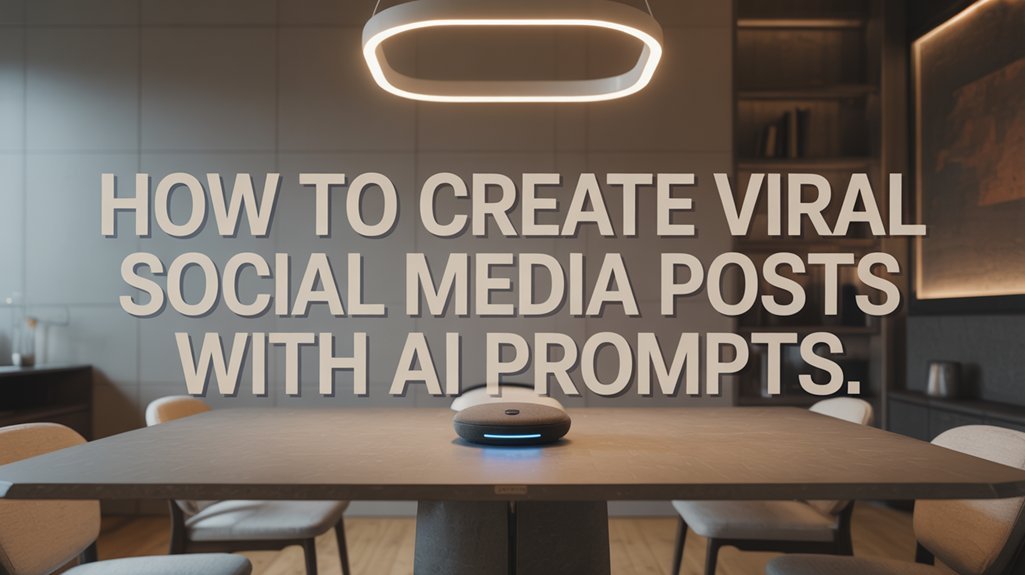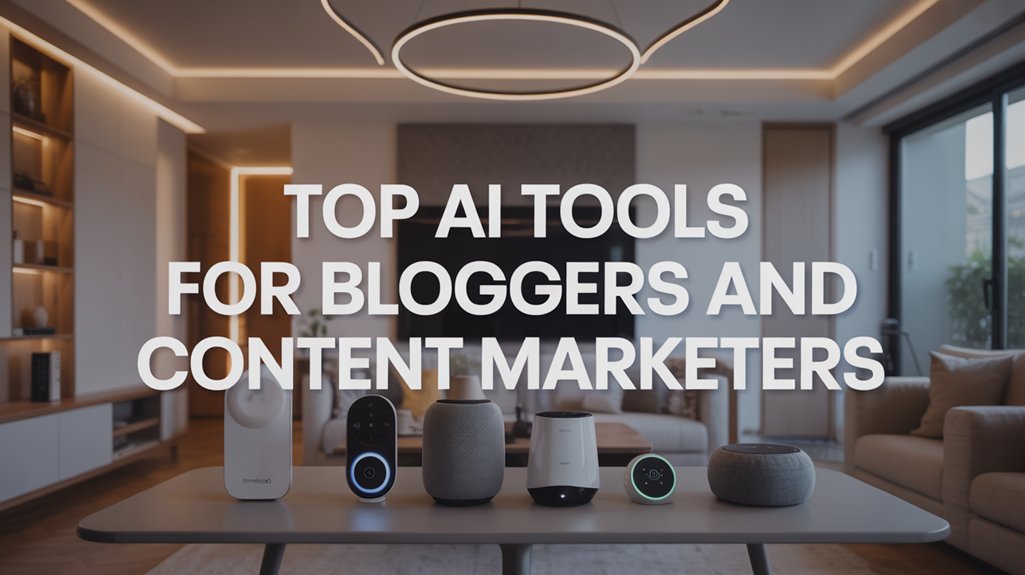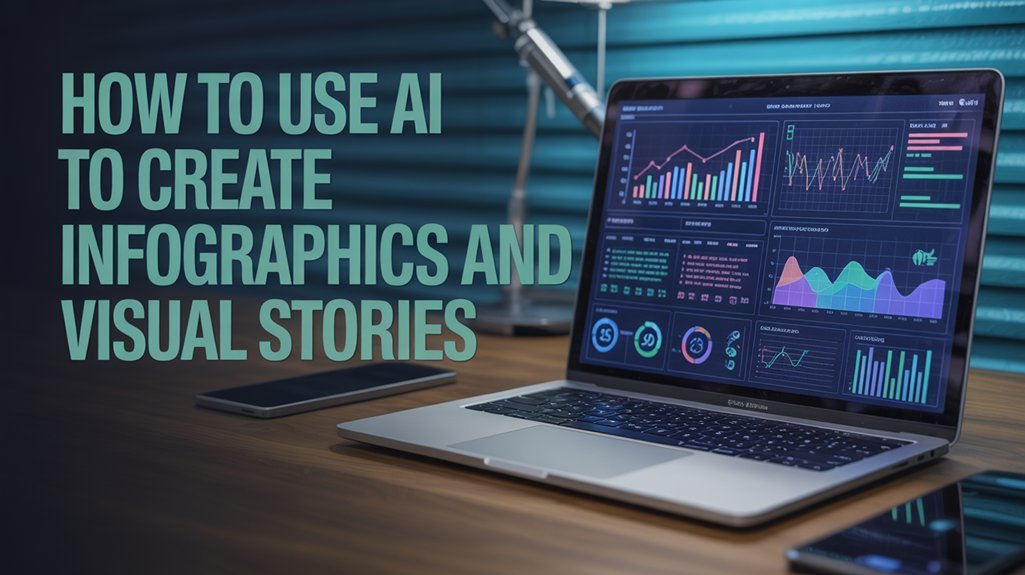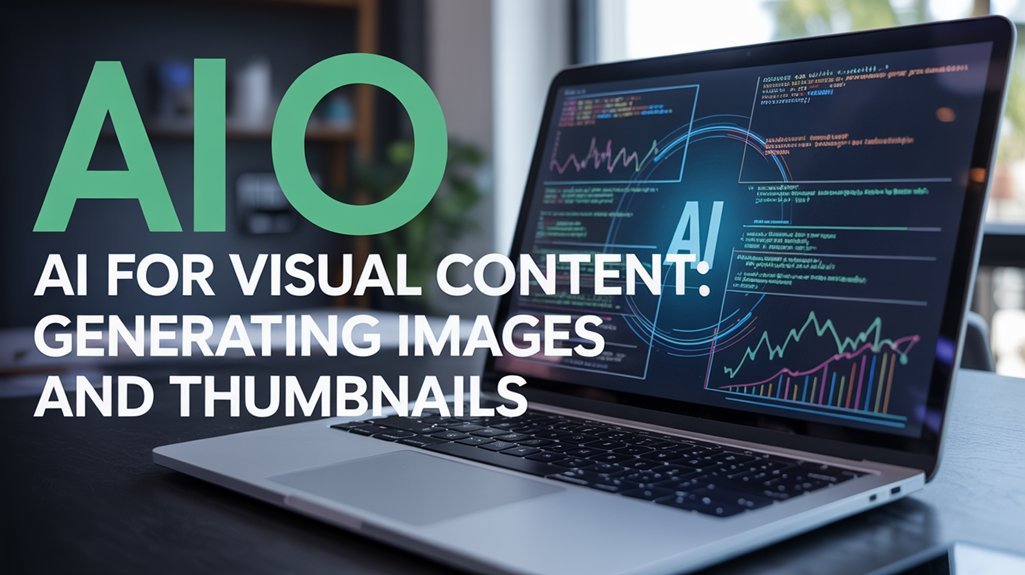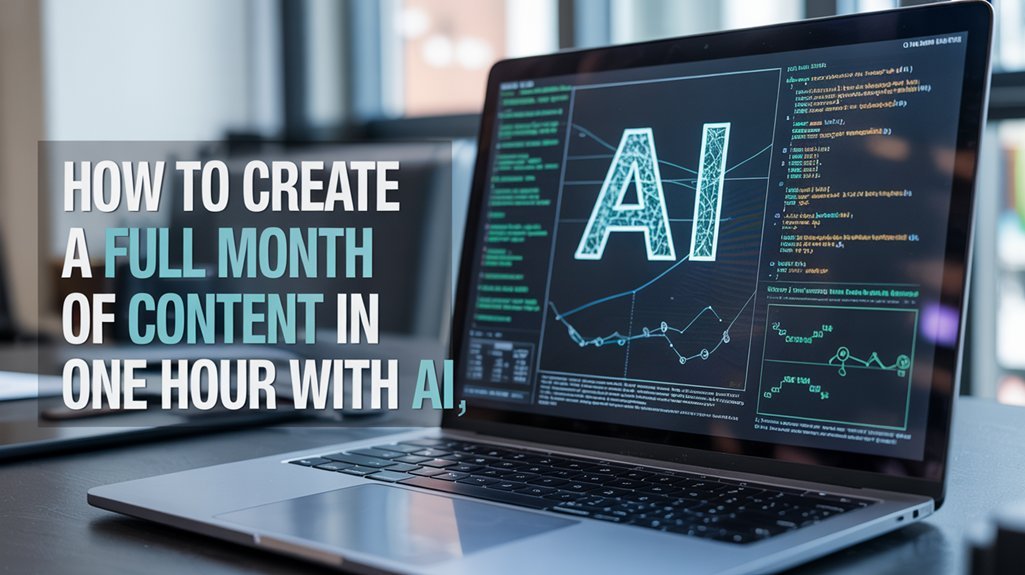AI-powered content planning optimizes your workflow from research to publishing by automating keyword analysis, identifying high-value topic clusters, and exposing competitor content gaps in minutes rather than hours. You'll utilize machine learning algorithms to decode search intent patterns and generate data-driven content roadmaps that prioritize quick wins. While AI handles the heavy lifting of research and optimization, your human oversight guarantees quality and brand alignment. Companies using this integrated approach publish 42% more content monthly while maintaining higher standards, and the strategies outlined below will show you exactly how to implement this competitive advantage.
Key Takeaways
- AI tools automate keyword research by analyzing vast datasets to identify high-value topics, content gaps, and ranking opportunities in minutes.
- Machine learning algorithms decode search intent patterns and generate data-driven outlines based on SERP analysis for maximum content impact.
- AI-powered competitor analysis reveals content gaps and vulnerabilities, enabling strategic targeting of unexploited topics for faster page-one rankings.
- Human oversight remains critical, with 97% of companies editing AI content before publishing to ensure accuracy, creativity, and audience alignment.
- Continuous performance tracking of engagement rates, organic traffic, and conversions enables data-driven refinements for sustained content success.
How AI Transforms the Content Planning Workflow
While traditional content planning demands hours of manual research and guesswork, AI-powered tools now complete these tasks in minutes with greater precision.
You'll utilize platforms like MarketMuse to identify high-value topic clusters and expose content gaps in competitor strategies, giving you decisive advantages in crowded markets.
Your keyword research evolves from tedious manual analysis into automated intelligence that processes vast datasets instantly.
AI content platforms generate data-driven insights that inform strategic decisions, while auto-generating outlines based on SERP analysis to accelerate your research phase dramatically.
The results speak clearly: companies integrating AI into their content strategy publish 42% more content monthly.
You'll exploit AI for brainstorming and outlining tasks, then apply human oversight—97% of companies edit AI-generated content before publication.
By leveraging AI insights, you can systematically optimize content performance and maintain competitive positioning in evolving digital landscapes.
This combination delivers superior output velocity without sacrificing quality, positioning you to dominate your content landscape systematically.
Advanced Keyword Research With Ai-Powered Tools
Machine learning algorithms now decode search intent patterns that manual analysis can't detect, changing your keyword research from surface-level metrics into strategic intelligence.
Advanced keyword research through AI-powered tools delivers competitive advantages you can't achieve manually—analyzing massive datasets to extract keyword difficulty, competition levels, and topical clusters in minutes rather than days.
You'll dominate your niche by leveraging platforms like Semrush and LowFruits to identify content gaps your competitors haven't exploited.
AI's clustering capabilities prioritize keyword opportunities based on topical relevance, eliminating guesswork and maximizing your content's impact potential.
The data speaks clearly: companies deploying AI for keyword research publish 42% more content monthly than competitors still relying on traditional methods.
You're not just finding keywords—you're uncovering strategic pathways to market dominance.
Alter raw search data into actionable intelligence that drives measurable results and positions your content where your audience actively searches.
These AI-driven approaches unlock the power of AI for SEO success by transforming traditional optimization workflows into data-backed strategies that consistently outperform manual methods.
Identifying High-Value Topic Clusters and Content Opportunities

You'll enhance your content ROI by leveraging AI to uncover high-value topic clusters that align with both search demand and your strategic objectives.
AI-powered analysis reveals precisely where your competitors fall short, exposing content gaps you can exploit to capture untapped audience segments.
This data-driven approach alters scattered keyword lists into cohesive content opportunities that directly address your audience's needs while strengthening your topical authority.
AI SEO simulation enables you to test content strategies before publication, validating which topics will drive the strongest search performance and user engagement.
AI-Powered Topic Discovery
As content markets grow increasingly saturated, AI-powered topic discovery tools have revolutionized how strategists identify opportunities that drive measurable results.
You'll utilize platforms like MarketMuse to analyze your content inventory, pinpointing high-value clusters that enhance competitive advantage. These AI tools change traditional keyword research by uncovering content gaps your competitors haven't addressed—revealing untapped territories where you'll dominate search rankings.
Your strategic edge intensifies when AI dissects competitor publications, exposing underrepresented topics that resonate with your audience.
You'll receive personalized difficulty assessments that prioritize content opportunities based on competitiveness, ensuring resource allocation delivers ROI. This data-driven approach accelerates theme identification, aligning content planning directly with business objectives.
You're not just filling content gaps—you're strategically positioning your brand where market voids create the greatest potential for authority and growth. By implementing AI content optimization techniques, you'll refine topic selection to target search intent patterns that maximize organic visibility and user engagement.
Competitive Content Gap Analysis
Competitive content gap analysis converts raw topic discovery into strategic positioning by mapping precisely where your competitors fall short.
You'll utilize AI tools like MarketMuse to dissect competitor content strategies, exposing critical content gaps that represent untapped market opportunities. These platforms analyze your content inventory against competitors, revealing high-value topic clusters where you can establish dominance.
The advantage lies in personalized difficulty assessments—you're not chasing every gap, but targeting those where your existing authority gives you the best odds of ranking.
This data-driven approach to competitor analysis eliminates guesswork from your content strategy, enabling you to allocate resources toward topics that deliver maximum competitive advantage.
You'll create content that fills market voids your competitors haven't recognized, positioning you as the definitive authority.
Competitor Analysis and Content Gap Detection
You can't create content that stands out without knowing where your competitors fall short.
AI-powered gap analysis alters this process by scanning competitor strategies at scale, pinpointing the exact topics and angles they've missed that your audience actively searches for.
This data-driven approach lets you prioritize content opportunities based on both search demand and competitive weakness, turning overlooked gaps into your strategic advantage.
Identifying Competitor Content Weaknesses
Why do some content strategies consistently outperform others in search rankings and audience engagement?
You'll find the answer in systematically exposing your competitors' content vulnerabilities. AI tools like MarketMuse enable you to dissect where rivals fall short, converting their weaknesses into your content opportunities.
Execute this three-phase attack:
- Map competitor content coverage to identify topics they've completely ignored or superficially addressed.
- Analyze content gaps using personalized difficulty assessments that reveal which ranking opportunities you can realistically dominate.
- Prioritize quick wins by targeting areas where competitors lack depth, leveraging your existing authority for immediate traction.
This data-driven approach doesn't just fill content gaps—it positions you to capture high-value traffic your competitors didn't know existed.
Strategic advantage belongs to those who act decisively.
AI-Powered Gap Analysis
Traditional content audits require weeks of manual analysis—AI-powered gap analysis delivers those insights in minutes. You'll identify content opportunities your competitors overlooked, altering their blind spots into your competitive advantages.
AI examines your existing content against competitor inventories, revealing untapped topics that differentiate your brand. Content strategists gain personalized difficulty scores for each opportunity, prioritizing topics aligned with your current authority.
| Analysis Type | Manual Process | AI-Powered |
|---|---|---|
| Time Required | 2-4 weeks | Minutes |
| Gap Identification | Limited scope | Thorough |
| Difficulty Assessment | Subjective | Data-driven scoring |
Tools like MarketMuse analyze your content inventory to surface quick wins—topics where you've already built authority but haven't fully utilized. You'll strategically allocate resources to enhance ROI, addressing high-impact gaps that drive rankings and engagement.
Uncovering Overlooked Topic Opportunities
While your competitors publish content on obvious industry topics, AI-powered analysis reveals the lucrative gaps they've missed entirely.
You'll dominate untapped opportunities by leveraging machine learning to dissect competitor analysis data and expose content gaps your rivals can't see.
Strategic AI tools convert keyword clustering into actionable intelligence through:
- Automated competitor content audits that map every topic they've covered and flag the valuable ones they've ignored
- Difficulty scoring algorithms that calculate your fastest path to page-one rankings based on your existing authority
- Topic cluster identification that reveals high-value content strategies competitors haven't connected yet
You're not just filling content gaps—you're claiming territory before competitors recognize it exists.
This data-driven approach eliminates guesswork, accelerates your market positioning, and converts overlooked topics into measurable traffic advantages.
Building Personalized Content Roadmaps
Every successful content strategy begins with a clear roadmap—yet most teams waste hours manually piecing together disconnected ideas and uncertain priorities.
AI-driven tools eliminate this inefficiency by analyzing your content inventory and generating personalized content roadmaps that align with business objectives and audience preferences.
These systems identify high-value topic clusters instantly, directing your efforts toward opportunities with maximum engagement potential.
By leveraging content performance data, AI enhances scheduling and guarantees you're deploying the right mix of content types at strategic intervals.
You'll gain precise recommendations for structure, depth, and competitive positioning—transforming vague ideas into executable strategies.
This approach simplifies execution while addressing user intent and market gaps simultaneously.
The result? You'll reclaim countless planning hours and redirect that energy toward creating authoritative, refined content.
Your content roadmap becomes a versatile asset that drives measurable outcomes rather than a static document gathering digital dust.
AI-Assisted Content Calendar Development and Optimization

Most content calendars collapse under the weight of inconsistent publishing schedules and misaligned priorities—transforming what should be a strategic asset into an operational bottleneck.
AI-assisted content calendar development eliminates this dysfunction by analyzing your historical performance data to enhance content types for maximum engagement.
AI transforms historical performance data into optimized content strategies that eliminate planning dysfunction and maximize audience engagement.
You'll gain three competitive advantages:
- Strategic scheduling precision – AI tools align publishing content with audience behavior patterns and business objectives, ensuring ideal timing.
- Accelerated output capacity – Companies leveraging AI report a 42% increase in monthly publishing content frequency without sacrificing quality.
- Cross-channel synchronization – AI maintains messaging consistency across platforms, strengthening brand coherence and market presence.
The system generates personalized recommendations based on your publishing capacity and desired content ratios, eliminating guesswork.
You're no longer constrained by manual planning limitations—AI fills your calendar with strategically balanced content types that drive measurable results.
This operational efficiency translates directly into market dominance.
Structuring and Outlining Content for Maximum Impact
Strategic content structure determines whether your audience engages for seconds or converts into customers—yet 68% of content fails because it lacks intentional architectural design.
You need AI tools that analyze top-performing content to automatically generate outlines aligned with user intent and search queries. These platforms conduct SERP analysis, identifying critical user questions that shape your content structure for maximum relevance.
Deploy AI-driven LSI keyword integration to improve discoverability while maintaining clarity. Your outlines should reflect strategic content pillars and subtopics that directly support your brand objectives and resonate with your target audience's priorities.
Implement real-time SEO optimization during creation. AI tools provide immediate feedback on content structure, enabling tactical adjustments before publication. This approach eliminates guesswork and guarantees every section serves a strategic purpose.
Your competitive advantage lies in architectural precision—structured content that commands attention, delivers value efficiently, and converts browsers into committed customers through deliberate, AI-improved design.
Content Creation and AI-Driven Optimization Techniques

While traditional content creation drains resources and delays publication schedules, AI-powered tools accelerate production by 42%—enabling companies to scale from 12 to 17 monthly articles without compromising quality.
Your content creation workflow evolves when you utilize AI-driven optimization at every stage:
- Keyword research automation analyzes massive datasets instantly, delivering practical insights that would take your team weeks to compile manually.
- Intelligent structuring through tools like ChatGPT simplifies brainstorming and outlining—76% of companies now use AI to accelerate ideation and create coherent frameworks.
- Performance monitoring provides real-time data on audience engagement, allowing you to refine your content strategy continuously.
However, AI doesn't replace human expertise—97% of organizations edit AI-generated content before publication. You maintain control while amplifying efficiency.
This hybrid approach positions you to dominate your market through superior content velocity, precision-targeted messaging, and data-informed optimization that competitors can't match.
Quality Assurance and Human Review Process
Quality control distinguishes successful AI content strategies from costly failures—and your human review process determines whether published material builds or erodes audience trust.
Your human review process is the critical difference between AI content that builds trust and content that destroys it.
With 97% of companies editing AI-generated content before publication, you're compromising competitive advantage if you're among the 4% who don't. Implement a multi-layered content review system: 80% of leaders manually verify accuracy, while 35% utilize subject matter experts and 30% deploy dedicated editors for quality assurance.
Structure your workflow to enhance AI's strengths while enforcing human oversight where it matters most. Use AI for brainstorming (76%) and outlining (73%), then route drafts through your expert review pipeline.
This approach accelerates production without sacrificing credibility. Remember: algorithms refine for patterns, but humans validate for truth. Your audience doesn't care whether AI wrote your content—they care whether it delivers actionable value.
Strategic human intervention guarantees it does.
Measuring Performance and Refining Your Content Strategy

Publishing quality content means nothing if you can't prove its worth—your measurement framework determines whether your AI content investment delivers ROI or drains resources.
Measuring performance requires strategic tracking of engagement rates, organic traffic, and conversion rates that directly impact your bottom line. AI tools automate this analysis, surfacing underperforming content instantly so you can pivot fast.
Your content strategy demands three non-negotiable performance actions:
- Monitor volume metrics – Track your 42% production increase against actual audience impact to guarantee quantity doesn't compromise content effectiveness.
- Identify resonant topics – Continuous monitoring reveals which subjects drive engagement, allowing you to double down on winners.
- Refine relentlessly – Like the 97% of companies editing AI output, use performance insights to enhance existing content and inform future creation.
Stop guessing. Your data tells you exactly what works. Extract those insights, adjust your approach, and dominate your content landscape through evidence-based iteration.
Frequently Asked Questions
Can I Use AI for Keyword Research?
Yes, you'll gain significant competitive advantage using AI tools for keyword research.
These platforms execute thorough keyword analysis at scale, processing vast datasets to identify high-value opportunities your competitors miss.
You'll accelerate your content strategy through automated trend identification and data-driven insights that pinpoint exactly where to dominate search rankings.
AI eliminates manual grunt work, letting you focus on strategic decisions that drive market share.
It's about leveraging technology to maintain your position at the industry's forefront.
Can I Use Chatgpt for Keyword Research?
Don't put all your eggs in one basket—ChatGPT excels at generating keyword ideas and identifying content gaps, but you'll need dedicated SEO tools for thorough trend analysis and competition assessment.
You can utilize ChatGPT's brainstorming power to uncover semantic opportunities and cluster topics strategically. However, validate its outputs with data-driven platforms like Ahrefs or SEMrush to dominate your market.
ChatGPT accelerates your research phase, but true competitive advantage requires pairing AI creativity with strong analytical tools.
What Is the Best AI to Use for Content Creation?
ChatGPT dominates as the premier choice, with 44% of marketers wielding it for content generation.
You'll gain maximum advantage through AI writing tools that deliver creative assistance across multiple formats—from blog posts to social media content.
However, your competitive edge comes from strategic implementation: combine automated storytelling with human oversight, as 97% of successful companies do.
This hybrid approach lets you publish 42% more content monthly while maintaining the quality that establishes your market authority.
Is AI Content Good for SEO?
Yes, AI content delivers powerful SEO results when you wield it strategically.
Like a printing press revolutionizing information distribution, AI advantages multiply your output—42% more monthly content targeting high-value keywords.
You'll dominate search rankings by combining AI's data-driven efficiency with human oversight for superior content quality.
The winning formula? Utilize AI for SEO strategies while maintaining editorial control.
This hybrid approach positions you ahead of competitors who haven't mastered this competitive edge yet.
Conclusion
You've seen how AI simplifies every phase—from research to publishing. Now here's what matters: companies using AI-powered content planning report 3.2x faster time-to-publish while maintaining quality standards. You're not just working faster; you're making smarter decisions backed by data. Start with one AI tool in your workflow this week. Test it against your current metrics. Refine based on performance. Your competitive advantage isn't adopting AI—it's mastering how you integrate it into your strategic content operations.

